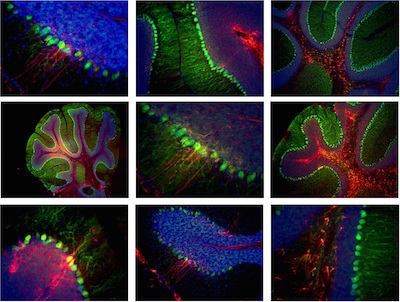About the Training Program

Davidson Lab: Compilation of sagittal sections of the mouse cerebellum stained for Calbindin (green), GFAP (red), DAPI (blue).
The Training Program in Neurodevelopmental Disabilities, was established in 1998 and has been continuously supported by the National Institute of Neurological Disorders and Stroke (NINDS). The focus of the program is on understanding intellectual and developmental disabilities caused by chromosomal defects, inborn errors of metabolism (aminoacidurias, urea cycle defects, etc.) or hypoxia and trauma (perinatal insult, traumatic brain injury, etc.). Individuals supported by the program pursue full-time research training. This includes planning, executing, and publishing primary research. This experimental training is complemented with an educational program of selected didactic courses and an individualized clinical practicum. In addition, trainees interact with internationally renowned scientists who come to present their research at lectures sponsored by the institutional Intellectual and Developmental Disabilities Research Center (IDDRC).
An executive committee selects trainees from the postdoctoral fellows who apply for the program. We particularly encourage applications from members of minority groups that are underrepresented in science. In order to ensure that the selected trainees fully take advantage of the rich opportunities that the program offers, trainees are carefully supervised and their progress is monitored with a series of obligatory oral presentations and regular written reports from both trainees and their mentors. Individuals who complete the program are expected to become future leaders in discovering causes and developing treatments for children affect by neurodevelopmental disabilities by assuming positions as major medical schools, pharmaceutical companies, or by pursuing related careers.